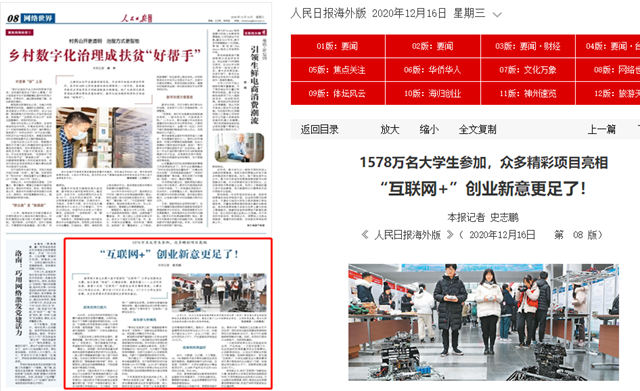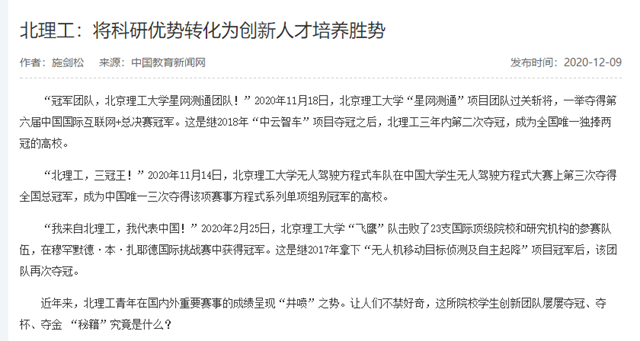【新华网】中国焦点:长期定居中国的外国友人看中国的发展
发布日期:2017-09-26 供稿:新华网 编辑:薛乔丹 审核:王征 阅读次数:
原文标题:China Focus: China's development through the eyes of long-term expats
中国焦点:长期定居中国的外国友人看中国的发展
原文链接:http://news.xinhuanet.com/english/2017-09/24/c_136633519.htm

BEIJING, Sept. 24 (Xinhua) -- About 800,000 foreigners living in China have shared both the hardships and benefits of the country's development, and a look at China through their eyes provides insights into how the nation has been transformed and what it can offer the world.
(新华社北京9月24日电)在中国,80万余外国人共同见证了中国发展经历的一系列困难以及克服困难后所获得的利益。通过他们的视角来看中国,你完全可以了解到中国做了怎样的转型,并为世界带来了什么。
AN AMERICAN IN XIAMEN
厦门的美国人——威廉?布朗
After living in China for 29 years, William Brown, an MBA professor at Xiamen University, is often considered something of a China expert.
在中国生活了29年的厦门大学MBA教授威廉?布朗,经常被叫做中国“百事通”。
Back in 1988, William sold his company and moved to Xiamen, a coastal garden city in east China's Fujian Province, with his wife and two sons.
早在一九八八年,威廉卖了他的公司,带着他的妻儿一同搬到了这个位于福建省东部的沿海花园城——厦门。
"I chose Xiamen University because it was the only university that allowed foreigners to take their families with them to learn Chinese at that time," said the former U.S. military man, once stationed in Taiwan.
谈到当初如何做的决定,这位曾一度驻扎在台湾的美国前军事人员解释说:“我当初选择了厦门大学,因为这是唯一一所大学允许外国人及其家人一同学习中文。”
The Brown family flew from California to Hong Kong, where they took a miserable 18-hour boat ride to reach the coastal city.
布朗一家四口当初先从加利福尼亚州飞往香港,然后又度过了18小时船程,才辗转到达了这座沿海城市。
Back then, there were only three bus routes in the whole city.
当时,全厦门市也就只有三条公交路线。
"The floor of the buses were made of wood, and the bus exhaust fumes could come into the bus," he said.
“当时,公共汽车的地面是用木头做的,汽车尾气也可以进入车里。
Brown said he has witnessed China changing from being "really backward" to moderately prosperous over 30 years.
布朗还说,他在这近30年间见证了中国从“相当落后”到现在的繁荣发展。
In addition to teaching, he has been committed to developing English websites and has published more than 10 English books about Xiamen.
除了教学外,布朗也一直致力于开发英语网站,并且他发表了十多本关于厦门的英文书籍。
Brown said he was excited when he once walked into a bookstore and found that several young students were reading his books with a dictionary in their hands.
布朗说,他曾经走进一家书店并很兴奋地发现,发现有几个年轻的学生一边阅读他的书籍,一边用手中的字典查阅不懂的词汇。
"The young people love their city and want to know a foreigner's perspective on it," he said.
他说:“那些年轻人热爱自己的城市,同时,他们也想获知外国人对这座城市的评价与理解。”
This inspired him to publish the Chinese edition of the book "Discover Gulangyu." This small island in Xiamen entered the UNESCO world heritage list in July this year for its cultural history and historic buildings.
这极大地鼓舞了布朗出版他的中文书《发现鼓浪屿》。也就在今年七月,鼓浪屿——这个厦门小岛,因其文化历史和历史建筑被选入联合国教科文组织世界遗产名录。
Brown said he was more than happy that a traditional Chinese version would be published in Taiwan later this year.
布朗说,没有什么比今年晚些时候他的中文书籍可以在台湾发售更开心的事了。
"Only when the youth understand history can they walk into the future," he said.
“只有青年人了解了历史,他们才能更好地走向未来。”
He was excited when the city of Xiamen hosted the BRICS summit from Sept. 3 to 5.
9月3至5日,厦门主办的金砖国家峰会同样令他兴奋不已。
"The G7 and G20 are the past, while BRICS is the future," he said. "BRICS offers opportunities for countries to find a way to do business."
“G7峰会和G20峰会都已是过去时,而金砖国家峰会指引着未来”,“这将为各国提供发展商业的机会,”他说。
He said it is right that China has put forward the concept of "BRICS Plus" by inviting Egypt, Mexico, Thailand, Tajikistan and Guinea for dialogue.
中国提出邀请埃及、墨西哥、泰国、塔吉克斯坦与几内亚加入“金砖四国+”的强强对话是十分明智的。
A KOREAN IN HEFEI
合肥的韩国人——乔松惠
Korean teacher Cho Sung Hye landed in Hefei, capital of east China's Anhui Province, in 1996, and had no idea she would stay for so long. In 2006, she became the first person from the Republic of Korea (ROK) to get China's "green card" for permanent residence.
韩国籍老教师乔松惠于1996年来到合肥——安徽省省会。那时,她不知道自己会待在中国这么长时间。2006年,她成为第一个获得中国“绿卡”的韩国人,享有永久居留权。
"None of my friends back home knew where Hefei is in China, and there was not a single foreigner that I could find in the city," Cho said, in fluent Chinese.
乔老师用一口流利的中文说道:我在韩国的朋友没有一个人知道合肥在中国的具体位置。当时,我在这座城市里遇不到一个外国人。”
She remembered that 1996 was just four years after the late Chinese leader Deng Xiaoping made a series of landmark speeches marking China's opening up and modernization.
There were only eight students in her Korean language class, which used the smallest classroom in Hefei College. Now the school has four Korean major classes, enrolling 500 students a year.
Over the past 20 years, Cho has seen 3,500 of her students go to the ROK for further studies.
她回忆道,在1996年,也就是在已故中国领导人邓小平提出了一系列具有里程碑意义的讲话标志着中国的改革开放和现代化建设的四年后,她在合肥大学最小的教室里讲授韩语课,而当时班级里只有8名学生。而现在学校有四个韩国专业班,每年招收500名学生。过去的20年里,乔老师有3,500名学生去韩国深造自己的学业。
"When I got here, I could not even find a Korean language dictionary. I asked my brother to mail me a dozen dictionaries and asked the consulate people from Shanghai for help to print teaching materials for my Chinese students," Cho said.
乔老师说:“当我刚来到这里的时候,我甚至找不到一本韩语字典。我还是叫我哥哥给我寄的一本字典,并请上海领事馆的人帮我的中国学生打印教材。”
She said it was the students' thirst and passion for learning a foreign language and new knowledge that inspired her.
正是学生们对学习外国语言以及新知识的渴求鼓舞了她。
"Even at that time, I could feel China's shining vigor and that it was on the way to rejuvenation into a great international power, and the world needed to establish closer ties with China," she said.
“即使是在那个时候,我也能感觉到中国重新焕发的活力,也能体会得到中国正走在成为国际大国的复兴之路上,与世界需要建立更紧密的关系。”
Cho is now more than a teacher. She still routinely has 10 classes a week at school, but in 2016 the 57-year-old woman started a cultural exchange business, which recruits international talent to Anhui.
她现在不仅仅是一名老师了。虽然,她仍每周在学校有10节课,但在2016岁,这位57岁的妇女开始了一项文化交流业务——将国际人才招募到安徽。
"China's wheel of development won't stop rolling. Too many foreign people that I know are eager to study, work and live here. I am so lucky that I've made it my home," she said.
“中国的发展不会停步。我认识的很多外国人,都渴望在这里学习、工作和生活。我真的十分幸运,在中国,我有了我的家,”她说。
Cho said she no longer suffered from homesickness as it takes less than three hours to fly from Hefei to Incheon Airport in Seoul.
乔老师也不再那么想家了,因为迅速的发展,从合肥飞往汉城仁川机场用时不到三个小时。
A JAPANESE IN BEIJING
北京的日本人——福田敏男
Toshio Fukuda, a Japanese nano-tech scientist, made his first visit to Beijing in 1995, attending a manufacturing technology summit at the invitation of China's Ministry of Science and Technology.
应中国科技部的邀请,日本纳米技术科学家福田敏男于1995年第一次访问北京,并出席了制造技术峰会。
Since then, his communication with China has continued. He has been teaching as a visiting professor in a number of China's high-tech institutions, including Harbin Institute of Technology, Chinese Academy of Sciences and Huazhong University of Science and Technology. From 2000, he decided to completely base his research work at Beijing Institute of Technology (BIT) and has stayed ever since.
此后,他与中国的沟通一直继续。曾任哈尔滨工业大学,中国科学院,华中科技大学等多家中国科研院所客座教授。从2000年起,他决定将他的研究工作完全在北京理工大学(BIT)完成,并且直到如今,也在足球竞彩app排名继续他的研究。
"As a scientist, I want the micro-nano field to grow bigger and deeper, no matter where my research is based," he said.
“作为一名科学家,无论我在哪里进行研究,我只希望微纳米领域的发展越来越好,”他说。
He led the innovation in developing micro-nano robots as small as a particle of dust in the air, and artificial blood vessels as thin as a capillary.
他领导了这项创新,研制出微型纳米机器人,其体积小如空气中的尘埃颗粒,人造血管细如毛细血管。
He said that Chinese people worked very hard. When he first came to China, the only computer integrated manufacturing was in a lab of Tsinghua University.
他说中国人民工作很努力。当他第一次来到中国,唯一的计算机集成制造是在清华大学的实验室里。
"The Chinese government did not have a lot of funding, but it funded Tsinghua's research," he said.
他说:“当时,中国政府并没有很多资金,但是却选择资助了清华的研究。”
By 2000, he could see research on robotic technology was spreading to science institutes all over China.
到2000年,他可以看到机器人技术的研究正在向全国各地的科学研究机构传播。
Fukuda said he chose BIT as his base because of the research environment, and because the National Science Foundation provided funding for his research.
福田教授解释说他之所以选择北京理工大学作为他的基地,是因为其良好的研究环境,并且由于国家科学基金会也为他的研究提供资金资助。
"The school has a very nice human relationship and facility, and the Chinese I know work harder than the Japanese," he said.
他说:“学校有着非常好的人际关系和完备的设施。中国人也比日本人更加努力,”
China is his home now, and many people tell him that he is already half-Chinese. Indeed, his favorite food is hot-pot, a spicy Sichuan-style food, and his youngest daughter also speaks Chinese.
中国现在是他的家,很多人评价他已经是半个中国人了。事实上,他最喜欢的食物是四川火锅,他的小女儿也会讲中文。
"In 2025, micro-nano robotics will be very important for China to realize its modern industrial manufacturing goals. How can we make it different from countries? Better performance, higher efficiency and lower cost. That's what micro-nano robotics are going to do," Fukuda said.
“2025年,微纳机器人将对中国实现其现代工业制造目标非常重要,我们如何使才能与国家不同?应该就是更好的性能,更高的效率和更低的成本吧,这就是微纳机器人将要做的,”福田教授说。
分享到:

